 Operation and Maintenance
Operation and Maintenance
 Linux Operation and Maintenance
Linux Operation and Maintenance
 What are linux commands and dos commands
What are linux commands and dos commands
What are linux commands and dos commands
Linux commands are commands for managing Linux systems. There are two types of them in the system: 1. Built-in Shell commands, which are recognized by the shell program and run inside the shell program. They are executed when the system starts. Transferred into the memory, it is resident in the memory; 2. External commands (file system commands) are programs outside the bash shell. DOS command refers to the command of DOS operating system, which is a kind of disk-oriented operation command, mainly including directory operation commands, disk operation commands, file operation commands and other commands.
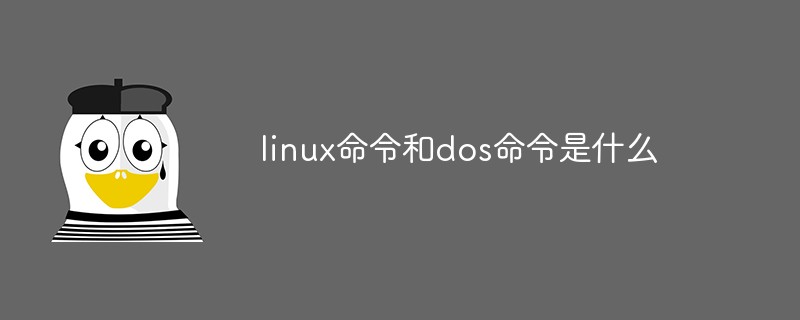
The operating environment of this tutorial: linux7.3&&windows10 system, Dell G3 computer.
What is the linux command?
The linux command is a command for managing the Linux system. For the Linux system, whether it is the central processor, memory, disk drive, keyboard, mouse, or user, they are all files. The commands for Linux system management are the core of its normal operation, similar to the previous DOS commands.
There are two types of Linux commands in the system: built-in Shell commands (built-in commands) and Linux commands (external commands).
The built-in commands are transferred into the memory when the system starts. They are resident in the memory, so the execution efficiency is high.
External commands are software functions of the system, which are read from the hard disk into the memory when the user needs them.
1. External commands
External commands are also called file system commands. They are programs other than the bash shell. They are not part of the shell. part. External commands are typically located in /bin, /usr/bin, /sbin, or /usr/sbin. External commands are the utility part of the Linux system. Because the functions of utility programs are usually relatively powerful, the amount of programs they contain will also be large. When the system is loaded, they are not loaded into the memory together with the system, but when needed. Only then will it be called into memory.
Usually the entity of the external command is not included in the shell, but its command execution process is controlled by the shell program. The shell program manages the path search, loading and storage of external command execution, and controls the execution of commands. External commands are installed additionally outside of bash, usually placed in /bin, /usr/bin, /sbin, /usr/sbin... etc. You can use the "echo
$PATH" command to view the storage path of external commands, such as: ls, vi, etc.
2. Built-in commands
The internal commands are actually part of the shell program, which contain some relatively simple Linux system commands, which are recognized by the shell program. And complete the operation inside the shell program. Usually when the Linux system is loaded and run, the shell is loaded and resides in the system memory.
Internal commands are written in the bash source code, and their execution speed is faster than external commands, because parsing the internal command shell does not require the creation of a child process. For example: exit, history, cd, echo, etc.
Explanation
The pwd command is a special command with two versions, one is a built-in command and the other is an external command.
3. Distinguish between built-in commands and external commands
Syntax
type command
Case
We use the type command to check the cd command is Internal command or external command, the specific command is as follows:
type cd
After running, the terminal output is as follows:

We see that the output cd is a built-in command , Now, we use the type command again to check whether the ps command is a built-in command or an external command. The specific command is as follows:
type ps
After running, the terminal output is as follows:

We see that the location of the ps command is output, that is, it indicates that the ps command is an external command.
#What is the dos command?
DOS command, a computer term, refers to the command of the DOS operating system, which is a disk-oriented operation command. , mainly including directory operation commands, disk operation commands, file operation commands and other commands.
Commonly used operating systems include windows 10, windows 7, etc., all of which have graphical interfaces. The operating system people used before these systems was DOS.
The dos command is actually similar to the function we usually use the mouse to click. The earliest computers did not have a mouse and a graphical interface, and they were all executed by entering commands. The graphical interface is used because the operation is more intuitive and concise, and it is popularized quickly.
1. How to use dos command
In the window system, press windows R and enter cmd to enter dos, as follows:
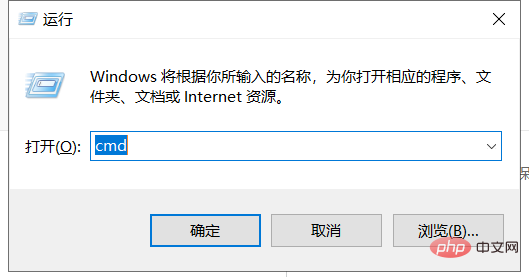
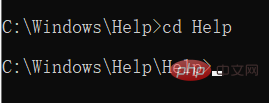
Among them, C:\User\***\ represents the current directory location (that is, the folder), and you can enter the command later.
2. Introduction to basic dos commands
Switch directory
cd Space the directory address to go to the folder you want to go to ( Absolute address)

# If you want to go to the folder under the current folder, you can use cd space folder name

If you want to change the drive letter, from drive C to drive D, you can directly enter D: to

View the folder contents
dir Space folder address, you can view the contents of the specified folder. If you do not add the folder address later, the content contained in the current folder will be viewed by default.
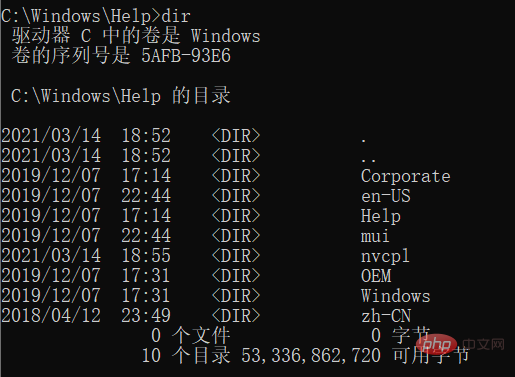
md command and rd command
are the abbreviations of make dictionary and remove dictionary, which are to create folders and delete folders. The syntax is the same.




ping command
ping space target ip (or url) that is You can check the network status between the local machine and the target.
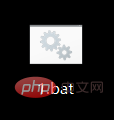
3. Batch file
If we need to execute multiple commands at once, we can write multiple commands in a text file, change the file suffix name to .bat, save it, and then execute the file, the computer will execute them one by one according to the order. Complete the command execution. For example:


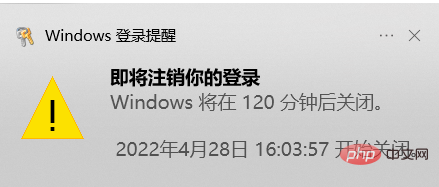

Then if we write this command to the batch file, the time will be changed to 2 minutes. And put this file into the self-starting folder of a friend's computer (friends who can afford to joke, be careful not to get beaten up, hahaha). What will happen? As soon as the other party turns on the computer, the file will be automatically executed, and the computer will prompt that the computer will automatically shut down in 2 minutes. If he doesn't know the dos command, I don't know how to cancel it. Then his computer is useless? Another friendly reminder: be careful of getting beaten!
Related recommendations: "Linux Video Tutorial"
The above is the detailed content of What are linux commands and dos commands. For more information, please follow other related articles on the PHP Chinese website!

Hot AI Tools

Undresser.AI Undress
AI-powered app for creating realistic nude photos

AI Clothes Remover
Online AI tool for removing clothes from photos.

Undress AI Tool
Undress images for free

Clothoff.io
AI clothes remover

AI Hentai Generator
Generate AI Hentai for free.

Hot Article

Hot Tools

Notepad++7.3.1
Easy-to-use and free code editor

SublimeText3 Chinese version
Chinese version, very easy to use

Zend Studio 13.0.1
Powerful PHP integrated development environment

Dreamweaver CS6
Visual web development tools

SublimeText3 Mac version
God-level code editing software (SublimeText3)

Hot Topics
 1381
1381
 52
52
 Difference between centos and ubuntu
Apr 14, 2025 pm 09:09 PM
Difference between centos and ubuntu
Apr 14, 2025 pm 09:09 PM
The key differences between CentOS and Ubuntu are: origin (CentOS originates from Red Hat, for enterprises; Ubuntu originates from Debian, for individuals), package management (CentOS uses yum, focusing on stability; Ubuntu uses apt, for high update frequency), support cycle (CentOS provides 10 years of support, Ubuntu provides 5 years of LTS support), community support (CentOS focuses on stability, Ubuntu provides a wide range of tutorials and documents), uses (CentOS is biased towards servers, Ubuntu is suitable for servers and desktops), other differences include installation simplicity (CentOS is thin)
 How to install centos
Apr 14, 2025 pm 09:03 PM
How to install centos
Apr 14, 2025 pm 09:03 PM
CentOS installation steps: Download the ISO image and burn bootable media; boot and select the installation source; select the language and keyboard layout; configure the network; partition the hard disk; set the system clock; create the root user; select the software package; start the installation; restart and boot from the hard disk after the installation is completed.
 Centos stops maintenance 2024
Apr 14, 2025 pm 08:39 PM
Centos stops maintenance 2024
Apr 14, 2025 pm 08:39 PM
CentOS will be shut down in 2024 because its upstream distribution, RHEL 8, has been shut down. This shutdown will affect the CentOS 8 system, preventing it from continuing to receive updates. Users should plan for migration, and recommended options include CentOS Stream, AlmaLinux, and Rocky Linux to keep the system safe and stable.
 Detailed explanation of docker principle
Apr 14, 2025 pm 11:57 PM
Detailed explanation of docker principle
Apr 14, 2025 pm 11:57 PM
Docker uses Linux kernel features to provide an efficient and isolated application running environment. Its working principle is as follows: 1. The mirror is used as a read-only template, which contains everything you need to run the application; 2. The Union File System (UnionFS) stacks multiple file systems, only storing the differences, saving space and speeding up; 3. The daemon manages the mirrors and containers, and the client uses them for interaction; 4. Namespaces and cgroups implement container isolation and resource limitations; 5. Multiple network modes support container interconnection. Only by understanding these core concepts can you better utilize Docker.
 Centos options after stopping maintenance
Apr 14, 2025 pm 08:51 PM
Centos options after stopping maintenance
Apr 14, 2025 pm 08:51 PM
CentOS has been discontinued, alternatives include: 1. Rocky Linux (best compatibility); 2. AlmaLinux (compatible with CentOS); 3. Ubuntu Server (configuration required); 4. Red Hat Enterprise Linux (commercial version, paid license); 5. Oracle Linux (compatible with CentOS and RHEL). When migrating, considerations are: compatibility, availability, support, cost, and community support.
 What to do after centos stops maintenance
Apr 14, 2025 pm 08:48 PM
What to do after centos stops maintenance
Apr 14, 2025 pm 08:48 PM
After CentOS is stopped, users can take the following measures to deal with it: Select a compatible distribution: such as AlmaLinux, Rocky Linux, and CentOS Stream. Migrate to commercial distributions: such as Red Hat Enterprise Linux, Oracle Linux. Upgrade to CentOS 9 Stream: Rolling distribution, providing the latest technology. Select other Linux distributions: such as Ubuntu, Debian. Evaluate other options such as containers, virtual machines, or cloud platforms.
 How to use docker desktop
Apr 15, 2025 am 11:45 AM
How to use docker desktop
Apr 15, 2025 am 11:45 AM
How to use Docker Desktop? Docker Desktop is a tool for running Docker containers on local machines. The steps to use include: 1. Install Docker Desktop; 2. Start Docker Desktop; 3. Create Docker image (using Dockerfile); 4. Build Docker image (using docker build); 5. Run Docker container (using docker run).
 What computer configuration is required for vscode
Apr 15, 2025 pm 09:48 PM
What computer configuration is required for vscode
Apr 15, 2025 pm 09:48 PM
VS Code system requirements: Operating system: Windows 10 and above, macOS 10.12 and above, Linux distribution processor: minimum 1.6 GHz, recommended 2.0 GHz and above memory: minimum 512 MB, recommended 4 GB and above storage space: minimum 250 MB, recommended 1 GB and above other requirements: stable network connection, Xorg/Wayland (Linux)



